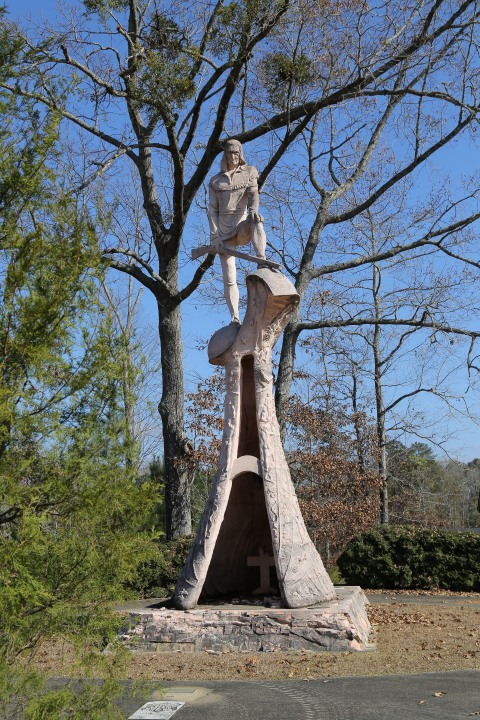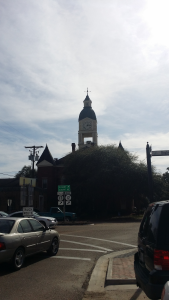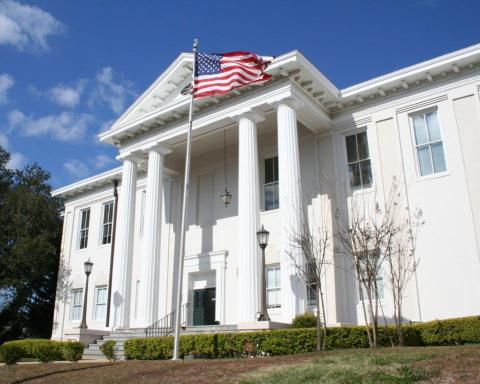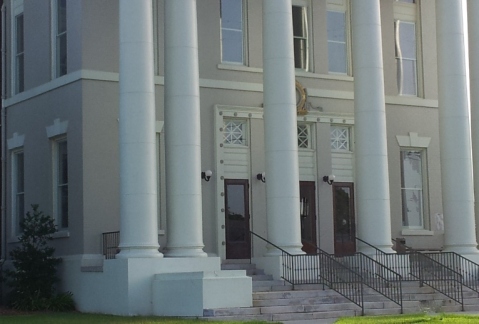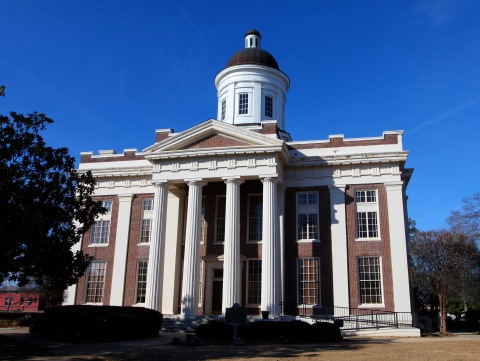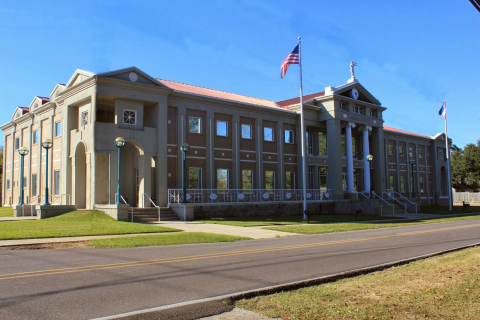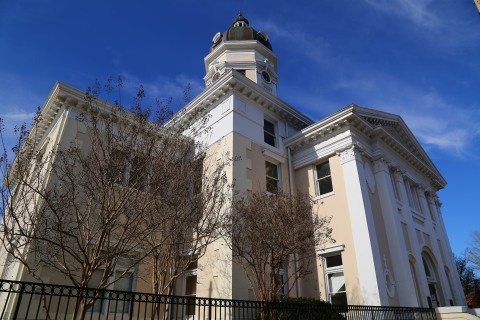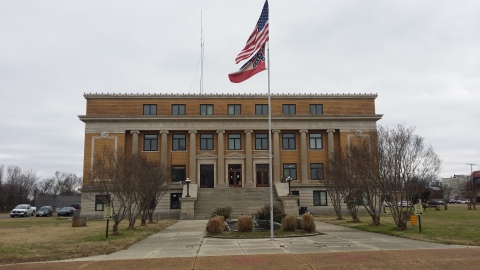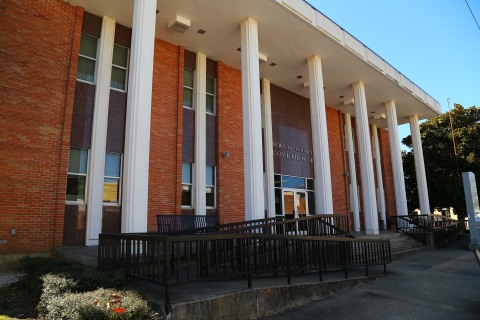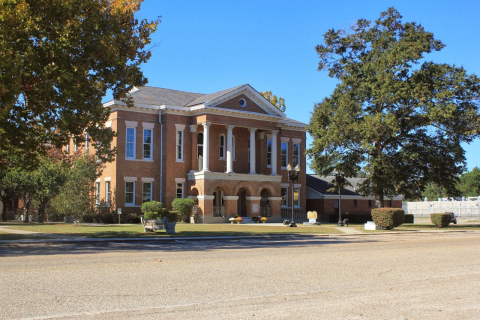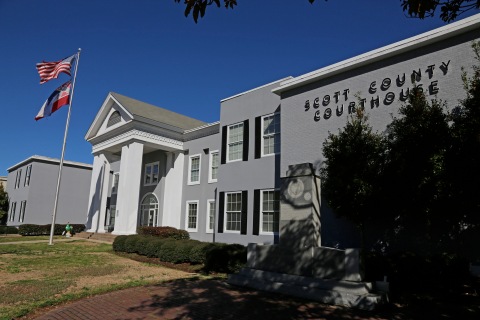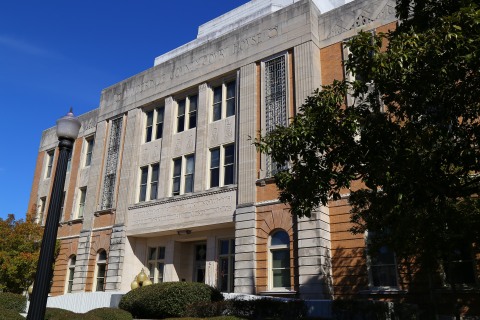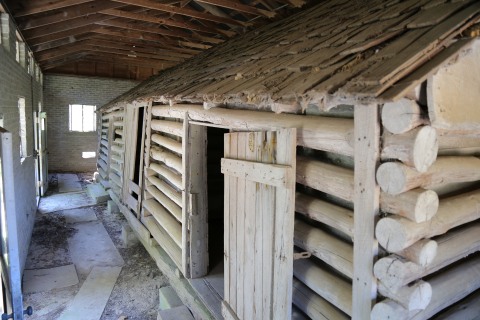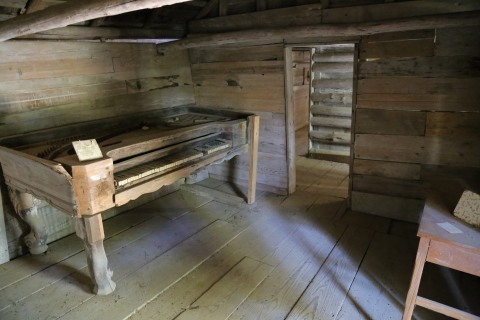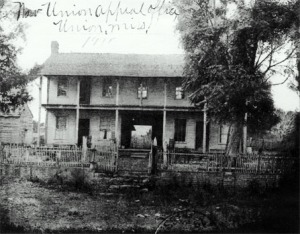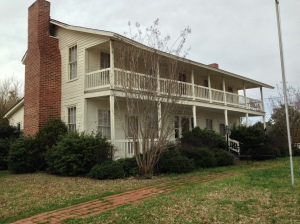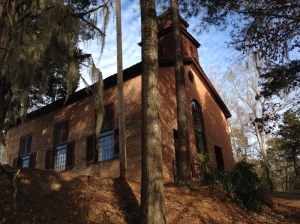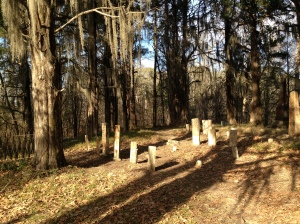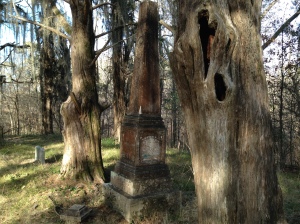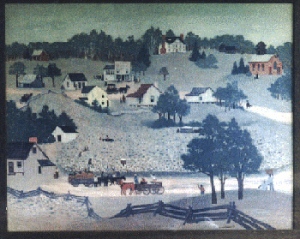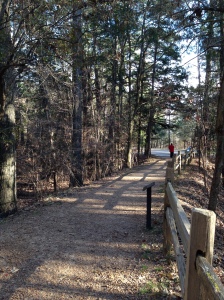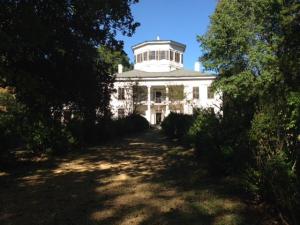Courthouses of Mississippi
February 13, 2015 § 1 Comment
Today we begin our tour of Mississippi’s courthouses, chancery buildings, and historic courthouses. Readers sent in many of the pics you will see. We still have many to go, so please send yours to lprimeaux@comcast.net. They don’t have to be works of art.
Boler’s Inn
March 22, 2014 § 1 Comment
On September 27, 1830, the Treaty of Dancing Rabbit Creek was signed, putting into motion the first great removal of Native Americans under recently-enacted federal laws. The treaty ceded around 11 million acres of Choctaw lands in a wide swath across Mississippi from the Mississippi River, southeasterly across the Delta, and encompassing all of east-central Mississippi. In exchange, the tribe acquired lands in what is now Oklahoma, and the treaty granted US citizenship to any Choctaws who chose to remain peacefully in their former territory.
The treaty was made public some five months later, and white settlers began to move into the length and breadth of the area affected by the treaty.
In 1833, in the area of East Mississippi ceded by the Choctaws, Neshoba County was formed, consisting of what is now Neshoba and Newton Counties. The county seat was established near the center of the new county, a few miles east of what is now the town of Union. The Montgomery-to-Jackson Stagecoach Road, a major thoroughfare, passed through the settlement.
In 1834, Wesley Boler sold his land in Hinds County and purchased land on the stagecoach road in an area known as New Ireland. Boler’s property encompassed what eventually became the entire town of Union.
In 1836, Neshoba County was divided into its present arrangement: Neshoba County to the north, with its county seat in Philadelphia, and Newton County to the south, with its county seat at Decatur. The town of Union grew up near the old county seat at the Neshoba-Newton County line.
In 1856, Boler built a two-story dogtrot home on the stagecoach road at the edge of the village of Union. Here is how the property appeared in 1907, in its earliest known photograph:
Only a few years later the Civil War had engulfed the nation, and in another couple of years it reached Newton County. Grierson’s Raid in 1863 resulted in armed clashes near Philadelphia and at the railroad station at Newton (loosely depicted in the 1959 John Wayne movie The Horse Soldiers). Sherman in 1864 marched a force of 20,000 through Newton County en route to his destruction of Meridian, burning the Decatur courthouse and tearing up miles of railroad on his way. On his return from Meridian to Canton, Sherman took over and spent the night in Boler’s home on February 21, 1864.
There is a local legend that Sherman declined to burn Boler’s home because he mistakenly believed or was falsely led to believe that the name “Union” had come about because Wesley Boler was in the Union army. Boler was, however, enrolled in the Confederate army. There is nothing in Sherman’s journals of the Meridian campaign to support the local account, although he does use quotation marks with the name “Union.” Was that an ironic wink at the inaptly-named town? He did not offer us an explanation.
We know from Sherman’s records that he had tarried at Meridian awaiting reinforcements of 7,000 cavalry from Memphis that never arrived, and, having completed the razing of Meridian and the destruction of all railroad lines and facilities in the surrounding area, Sherman determined to return to the main body of Union forces to the west. The journal of one of Sherman’s officers indicates that the force had marched 21 miles west from the burning of Meridian in haste to get to Canton the following day, and was in need of rest when it found Boler’s place to be the only suitable one in the area, which probably explains why the invaders did not take the time for destruction.
It is unclear when Boler’s home made the transition from private residence to Stagecoach Inn. It is reasonable to surmise that Boler himself may have taken in boarders soon after the home was built, given the location of the home on the heavily-travelled road, the lack of rail transportation in the area until later, and the configuration of the home that would enable the family to live comfortably downstairs with guests upstairs. Boler sold the building after the Civil War to a gentleman who did operate it as an inn and tavern.
Some claim that both Jefferson Davis and Stonewall Jackson were among the lodgers at Boler’s. It is quite possible that Davis stayed there, since his route eastward from his plantation near Natchez would have taken him through the area. If Jackson was ever a guest, that would help establish that Boler’s was an inn before the Civil War, since Jackson did not survive the conflict.
The property fell into disrepair through the years until a foundation took on its restoration. Today, it is restored and houses a museum. It is located in sight of Union’s downtown, in an area with some grand, old homes.
Carolshouse is one web site with historical notes and photographs of Boler’s Inn. The Newton County historical and Genealogical Society maintains another web site with a narrative history of the inn.
Trials of the Earth
February 28, 2014 § Leave a comment
Anyone who knows me can tell you that I am an epic history nerd.
So, when Circuit Judge Ashley Hines recently told me about a remarkable memoir of Mississippi Delta life in the 1880’s, I made it my business that very day to find and buy a copy at Square Books in Oxford.
 The book is Trials of the Earth, by Mary Hamilton, who lived from 1866 to 1937. How her papers came to be published is a story in itself.
The book is Trials of the Earth, by Mary Hamilton, who lived from 1866 to 1937. How her papers came to be published is a story in itself.
In 1931, Delta writer Helen Dick Davis and her husband, Reuben, moved to a home that Mr. Davis had built in Phillip, Mississippi, north of Greenwood. Reuben’s younger half-brother married Mary Hamilton’s daughter, Edris, and it was through this family connection that Helen Davis came to know and befriend Mary Hamilton, who lived nearby at the time.
As they whiled away time together, Helen was enthralled by Mary’s tales of a Delta altogether unknown and foreign to Helen’s experiences. The Delta that Helen knew was rich farmland under cultivation, civilized towns, culture and agriculture. The Delta that Mary painted in vivid hues was a nearly impenetrable wilderness of virgin timber and flood-prone bottomlands where people lived in isolation, in peril from sudden floods, storms, panthers, wolves, bears, snakes, and disease. It was a land where one’s very existence had to be wrested from the earth every day. Mere survival came at the cost of bone-wrecking toil.
Helen urged Mary to reduce her memories to writing, but the elderly woman, then in her mid-sixties, at first declined. It was only after she fell ill and had a feverish dream which she interpreted to mean that she should commit her story to paper that she began writing. And write she did. In 1933, she turned over a 150,000-word handwritten manuscript to Helen, who edited it and wrote a preface. She submitted it to Little Brown publishing house, which rejected it.
Before she could submit it to another publisher, however, she got word from Mary not to try any more to publish it. Mary said that her dead husband, Frank, had come to her in a dream and told her that the stories were their “private Valentine,” not for others to read. Helen put the manuscript away.
Helen’s daughter, Carolyn, discovered the manuscript in 1991, and submitted it to the University of Mississippi Press, where JoAnne Morris, wife of Willie Morris, was Senior Editor. Before she married Willie Morris, she had been JoAnne Prichard of Yazoo City, a co-worker of Helen Davis. The book was accepted for publication. It was released in 1992, only a few months after Helen died, and it included a foreword by Mississippian Ellen Douglas.
Mary Hamilton’s heirs filed suit to stop publication and to establish their claim to the rights, and they succeeded on both counts. The book sold out the run published by University Press, and lay un-republished until January, 2013, when it was self-published including the Davis and Douglas additions, and an introduction by Morgan Freeman. The 2013 edition is in paperback, and is available through Nautilus Publishing of Oxford.
As Ellen Douglas points out in her foreword, we have many portrayals of Delta life in the form of slave narratives and tales of upper-class plantation life, but memoirs depicting the everyday struggles of poor whites in the lowlands along the Mississippi River before the land was cleared and put into cultivation are practically non-existent. The story of the poor white settler of that era is what Mary Hamilton gives us.
In eloquent, simple language, Mary’s book tells how she was forced into a marriage to a secretive, mysterious Englishman when she was only 17 years old, and how they embarked on a hard life full of struggles, minor successes, gargantuan failures, births and deaths, dangers, joys and heartaches. They were among the first white people to enter the Mississippi Delta to clear it and make it habitable. Remarkably, all this occurred in only the twenty years or so before the dawn of the twentieth century. The following passage will give you a sense of what they were up against:
… Cane, undergrowth, blackberry briars, grape and poison oak and muscadine vines, all growing to enormous size out of that rich Delta ground, interlaced through that fallen timber so that it was one tangled mat. Not a trail or path through it.
But the whole country was almost as bad. A man couldn’t get through any of the woods without a compass in one hand and a cane axe in the other to blaze every foot of the way. In throwing the timber the men had to cut a path to their tree every morning. then they would estimate the direction they would throw the tree, and each man cut a path to get away in when the tree started to fall, and God help them if they couldn’t outrun the falling tree.
At the end of the book is a holographic transcription of Mary’s writing, demonstrating at once her command of imagery and description, as well as her inadequate spelling, grammar and lack of understanding of punctuation and paragraphing. The editors took care to preserve her plain language, correcting only as needed to render a readable product. Fair warning: the editors also left intact her language describing those of other races, which reflect the attitudes of her day, and not those appropriate to the 21st century.
You don’t have to be a history nerd to be fascinated by this book. It’s a story that oscillates between vibrant adventure and humdrum existence, pretty much like most people’s lives, which is a key reason why it is so approachable and entertaining.
Rocky Springs
February 22, 2014 § 3 Comments
The community of Rocky Springs, in Claiborne County, grew up at the site of natural springs near the Natchez Trace where settlers had first set down roots in 1796. The springs attracted thirsty travelers on the heavily-used Trace.
In 1837, a Methodist church was built on the bluff overlooking the village.
By 1860, the population of Rocky Springs had grown. Within two and one-half miles of the village center were more than 2,600 people, which number included around 2,000 slaves. Farming occupied most of the community outside the immediate environs of the town. Fifty-eight planters worked the land with slave labor, primarily in cotton, which was the area’s principal economic engine. Within the village there were physicians, merchants, trades, clergy, and even an academy.
General Grant’s invading army in 1863 marched north from its river crossing near Bruinsburg and passed through Rocky Springs on its roundabout march to invest Vicksburg.
The village survived the economic devastation of the Civil War, but traffic on the Natchez Trace had dwindled as the area developed and the wilderness receded. In 1878 the population was slashed by a yellow fever epidemic.
By the 1900’s poor farming practices and severe erosion had crippled the cotton industry, and In the 1920’s the boll weevil infestation essentially ended it in the area.
In the 1930’s the springs dwindled and then dried up completely. The last store closed.
The only surviving structure of the once-thriving community is the Methodist church. It continued active until 2010, when its membership became too small to sustain it, but its doors are still open to visitors. On the chilly day that we dropped in we added our names to the register alongside others from New York, Germany, New Zealand, the UK, and many other places.
Behind the church is its cemetery. Tombstones date from the early-to-mid 1800’s to the present.
The National Park Service displays a painting purporting to depict what Rocky Springs looked like in its heyday.
The painting may be fanciful, or it may be an accurate depiction. I can’t say for certain. It does show the land cleared and cultivated, as we know it was, and the cluster of village buildings below the bluff commanded by the Methodist church. Still, it’s hard to square that idyllic portrait with the overgrown, heavily wooded, and deserted contemporary scene.
Today, Rocky Springs is nothing more than an historical stop on the Natchez Trace with an interpretive trail through its site. There is a nearby campground.
Pending Legislation of Interest to Chancery Practitioners
February 10, 2014 § 1 Comment
Here is a list of bills that may be of some interest to you in your chancery practice. I relied on the titles to select the bills to list; I have not read all of these.
You can click on this link to find any of the listed measures. You will find information on the bill, including its status, sponsor, and the committee(s) to which it has been referred.
HB 32 Partition of property; revise method of appointing freeholders.
HB 44 Courts; prohibit from applying foreign law under certain circumstances.
HB 67 Special judges; revise compensation cap.
HB 126 Protection from domestic abuse; clarify record.
HB 218 Uniform laws; create Uniform Adult Guardianship and Protective Proceedings Jurisdiction Act.
HB 342 Uniform laws; enact Uniform Foreign-Country Money Judgments Recognition Act.
HB 409 Mississippi Bar; remove repealer.
HB 427 Licensed school employees; allow use of personal leave near holiday if summoned by court.
HB 486 Birth certificates; Tribal Court of the Choctaw Indians has same authority as chancery courts to make changes/corrections in.
HB 487 Tax liens; provide for centralized filing with the Department of Revenue.
HB 511 Liens; bring forward stop-notice sections.
HB 570 Evidence; revise provisions regarding certain privileged communications.
HB 579 Court Collections Fund; create.
HB 696 Real property; clarify certain identifying information for instruments presented to the chancery clerk for recording.
HB 810 “Andrew Lloyd Law”; require DHS to be notified before a mentally ill person receives treatment if person has minor children.
HB 837 Judicial qualifying deadline; bring forward for purposes of amendment.
HB 878 Sex offenders; clarify notice to volunteer organizations regarding status.
HB 882 Mississippi Entity Conversion and Domestication Act; enact.
HB 884 Unclaimed Property Act; revise several provisions of.
HB 885 Overdue child support; payable to custodial parent after emancipation of child.
HB 891 Rule against perpetuities; revise with respect to certain trusts.
HB 917 Mississippi Trust Decanting Act; create.
HB1014 Physician Order for Sustaining Treatment Act; create.
HB1026 Trial courts; bring forward circuit, chancery & district attorney sections.
HB1030 Commission Against Interpersonal Violence; create.
HB1031 Domestic abuse protection orders; authorize justice & municipal courts to issue final orders.
HB1033 Domestic violence; revise.
HB1042 Uniform Premarital and Marital Agreements Act; enact.
HB1058 Guardian ad litem; clarify duties and appointment.
HB1084 Uniform Power of Attorney Act; create.
HB1400 Abortion; prohibit performing at or after 20 weeks.
HB1411 Foreign executor or administrator; revise authority of financial institutions to turn over property or funds of a decedent to.
HC 25 Parental rights; State of Mississippi recognizes.
B026 Tax liens; provide for centralized filing with the Department of Revenue.
SB2125 Authority of chancery court to revise birth certificates; Tribal Court of MS Band of Choctaw Indians has same authority.
SB2180 Adoption; expedited for readoptions of foreign-born adoptees.
SB2240 Uniform laws; create Uniform Adult Guardianship and Protective Proceedings Jurisdiction Act.
SB2471 Cyber-bullying; revise and clarify electronic communication offenses.
SB2474 Trial courts; redistrict.
SB2476 Domestic violence; clarify sentencing status of multiple offender, revise protection order.
SB2480 Adoption records, confidentiality of; provide for contempt and misdemeanor proceedings.
SB2483 Mental commitment cases; revise screening process.
SB2559 Commercial Real Estate Broker Lien Act; create.
SB2622 Contractor’s liens; revise stop notice law.
SB2626 Domestic violence; revise penalty.
SB2629 Domestic violence; clarify when arrest may be made without warrant.
SB2676 Witness fees; conform to juror pay.
SB2727 Mississippi Uniform Trust Code; create.
SB2809 Uniform Power of Attorney Act; create.
SB2837 Domestic Violence Protection Order Registry; require arresting officer to perform check.
SC 523 Amendment to the United States Constitution relating to parental rights; urge Congress to propose.
SC 531 Post-ratify federal voting age 18 amendment to the United States Constitution.SC 542 United States Constitutional Convention under Article V; apply for federal debt consideration.
